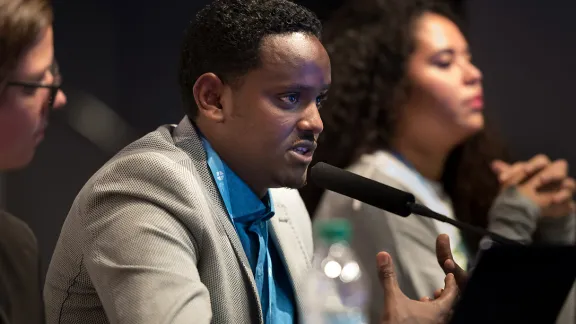
LWF Ethiopia program coordinator Biruk Kebede (center) speaks at the panel debate on Education, Youth and Climate Change at COP 22, in Marrakech, Morocco. Photo: LWF/Ryan Rodrick Beiler
LWF Ethiopia brings perspectives from communities devastated by climate change
(LWI) – Delegates from The Lutheran World Federation (LWF) and other non-governmental organizations taking part in the United Nations (UN) climate conference in Morocco, shared the opportunities and challenges they face in caring for creation during a side event at the global gathering.
“I’ve seen children suffer, I’ve seen women suffer,” said Biruk Kebede, program coordinator at the LWF country program in Ethiopia. “Two weeks ago I was in a village talking to an old woman. I’m here now in Marrakech talking to young leaders from all over the world. That is for me the connection that I bring,” noted the 29-year-old. He spoke at the “Education, Youth and Climate Change” panel debate sponsored by the LWF and the World Young Men’s Christian Association.
Kebede said his unique perspective as an Ethiopian was being able to “bring the voices of the most vulnerable to where the action is being taken, and to make sure that those voices are being heard by decision-makers.”
Fellow panelist Mathilde Emilie Thue from the Norwegian Children and Youth Council said it was the testimony of communities facing the effects of climate change in the global South that were most effective in engaging hearts and minds in her country where those changes are less apparent.
Kebede agreed: “We first have to know what's happening in the communities of those who are most affected, who are most vulnerable.”
Meanwhile, world leaders at the opening plenary of the 22nd session of the Conference of the Parties (COP 22) to the UN Framework Convention on Climate Change acknowledged that as an African COP, the 7-18 November conference needs to focus on the role of youth and particularly vulnerable communities in Africa and other global South regions. That can be a challenge when other crises compete for limited attention and resources, which for Kebede, is also a matter of perception.
Hunger and drought
“People are saying climate change is going to affect Africa after 20 years,” he noted. “We have civil war. We have hunger. We have young people migrating to Europe. That’s more prominent and that needs more action,” he added, referring to Ethiopia which declared an emergency in early 2016, following a two-year drought period, with 10.2 million people needing relief food assistance to survive. In May erratic rains returned to some parts of the country while other areas experienced heavy rainfall and flooding, also leading to devastation.
“The link that is missing is that the migration is happening because of the hunger. The hunger is happening because of the drought and the drought is happening because of climate change. So it’s time for us to create awareness about those correlations and the root causes of climate change,” Kebede added.
The 2015 Paris Agreement from COP 21 was a milestone in forging a global consensus to tackle rising temperatures and making commitment to mitigate the effects of extreme weather events especially on the most vulnerable people. The COP Presidency has declared this year’s as the “COP of actions”—with the expectation that world leaders will hammer out the details that will make ambitious goals a reality.
Youth initiatives and leadership
For Kebede, young people have an equally critical role in making climate justice a reality.
“Youth also have to get involved in action,” he says. “We need to partake and lead initiatives in our respective churches, schools, wherever we are.”
The LWF decided beginning in 2011 to make delegations of youth leaders its primary representatives to the annual UN climate conference. LWF Youth Secretary Caroline Bader says the decision was taken in part to build the leadership and advocacy capacities of these young leaders.
Kebede also shared about the lack of democratic spaces for youth in many countries and churches, and hopes they will be more integrated into forums, speak up and take part in decision making.
You can't always be at the back making noises. It’s also time that we step up and take the stage, and have a say in what our world should look like tomorrow.
“We at the LWF have a global commitment that 20 percent of the leadership is reserved for young people,” he emphasized. “You can't always be at the back making noises. It’s also time that we step up, and take the stage and have a say in what our world should look like tomorrow.”
He called on young people to “spread the message and be vocal about climate change,” and, encouraged by the recent Catholic-Lutheran joint commemoration in Lund, Sweden, concluded: “We need to pray for a change of hearts and minds not only for us but also for those who negotiate right now for the implementation of the Paris agreement.“
Working with communities in Ethiopia
The work of the LWF country program in Ethiopia includes assistance to rural small-scale farmers through irrigation schemes, supplying safe clean water for domestic use, training and technical support. During periods of drought or flooding the LWF provides relief food and other forms of assistance to those affected.
The LWF member church, Ethiopian Evangelical Church Mekane Yesus, also carries out rural development projects with communities that are most vulnerable to extreme weather events.
(By freelance journalist Ryan Rodrick Beiler at COP 22 in Marrakech, and LWF Communications)
Related links:
COP22 Interfaith climate statement
http://www.interfaithstatement2016.org/
Photos from faith-based events at COP22
WCC work on care for creation and climate change
https://www.oikoumene.org/en/what-we-do/climate-change
LWF at COP22
https://www.lutheranworld.org/content/un-climate-change-talks-cop22
ACT Now for climate


